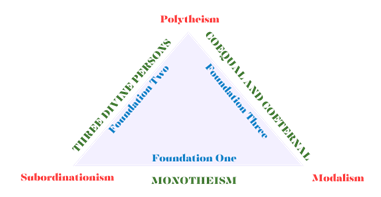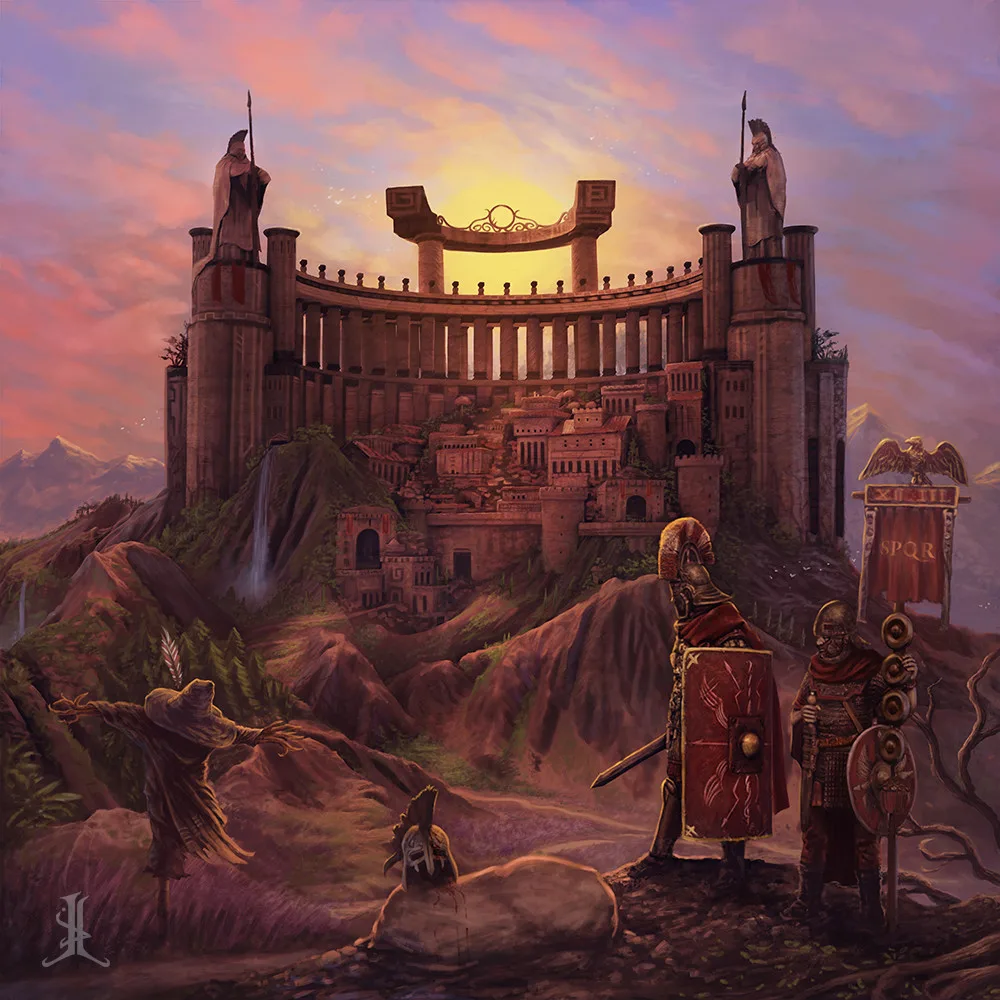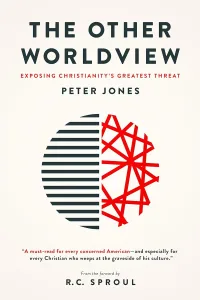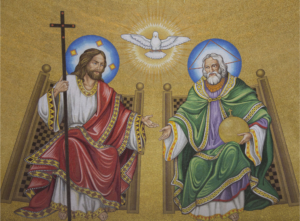God – One Being, Three PersonsI wanted to keep these articles focused on a single topic. That one was about who God is. This one is about who God is not.
Summary of Ideas about God
These summaries are high-level. They are general and subject to imprecision. I mean to approximate the positions described. I mean to distinguish rather than describe in a precise manner.Monotheism
This is the view held by the “desert religions”, Judaism, Christianity, and Islam. The basic premise is there is one personal God, who is the only true God. He is the creator of everything that exists and sustains all things with the power of his might. Yahweh the one, true God inaugurated Judaism. He selected Abraham for himself, to be the founder of a people for himself. Moses codified his Law, 450 years later. The Jews understand redemption of the world is to come through the Messiah. This will happen at a time in the future, relative to its inauguration. The OT does not assert the “plurality” of the godhead. The text implies it in passages throughout the OT. We see it where both God and the Angel of the LORD appear together. It is also implied in the vocabulary used to describe God. Examples:The angel of the LORD also said to her, “I will surely multiply your offspring so that they cannot be numbered for multitude.” (Gen 16:10)
He said, “Do not lay your hand on the boy or do anything to him, for now I know that you fear God, seeing you have not withheld your son, your only son, from me.” (Gen 22:12)
And the angel of the LORD appeared to him in a flame of fire out of the midst of a bush. He looked, and behold, the bush was burning, yet it was not consumed … When the LORD saw that he turned aside to see, God called to him out of the bush, “Moses, Moses!” And he said, “Here I am.” (Exo 3:2, 4)
In these three instances, we see examples of the Angel of God acting in the stead of God or with the authority of God. It is particularly noticeable in the third example in which the Angel (vs. 2) and God (vs. 4) appear to Moses in the same event.
“Hear, O Israel: The LORD our God, the LORD is one. You shall love the LORD your God with all your heart and with all your soul and with all your might. (Deu 6:4) Emphasis mine.
Therefore a man shall leave his father and his mother and hold fast to his wife, and they shall become one flesh. (Gen 2:24) Emphasis mine.
In these instances, one is a singularity of combining multiples. I find it interesting how this parallels the idea that God created man in the image of himself. The comparison of the unity in marriage with the description of God is not an accident.
In the beginning, God created the heavens and the earth. (Gen 1:1)
For the LORD your God is God of gods and Lord of lords, the great, the mighty, and the awesome God, who is not partial and takes no bribe. (Deu 10:17)
In both of these examples, the word highlighted is plural in Hebrew. There are many more examples I could give of hints of the plural unity of God in the OT. This is enough to support my assertion and I will stop with these.
Christianity is a radical reformation of Judaism. Jesus Christ fulfills the promise of the Messiah. It is in the NT that the concept of the Trinity is better revealed. The movement was first called the Way. Later it became Christianity as an insult. The Church began as converted Jews from both Palestine and the Diaspora. They understood Jesus as the Messiah, confirmed by his resurrection from the dead. They also understood that faith in Christ is the ground of redemption and inclusion in God’s people. He fulfilled The Law of the OT. The Law is no longer the ground of inclusion. It is faith in the person and work of Christ.
Islam is a form of hyper-monotheism that considers any “plurality” to be a denial of monotheism. Islam denies the divinity of Jesus Christ and the Holy Spirit. Jesus is a prophet, as is Muhammad. The Holy Spirit is the angel, Gabriel. Islam derives its authority from the Qur’an, the speech of Allah. The second source of authority is the Sunnah, the words and deeds of Muhammad. Shi’ah Muslims add a third authority, the writings of some of the early Imams. Islam believes Allah is the God of all the desert religions.
Both Jews and Christians reject Allah as a false god.
Deism
Deism may come closer than any other error to describing the God of the Bible. It still misses the mark by more than a small margin. Deists believe in a primary cause of the universe which is personal. That personal God detached himself completely from the cosmos and its concerns. That God got everything started then went on vacation, never to return. From the first creation until the present all that is in operation are natural laws. God is in no way immanent.
Polytheism
Polytheism is the belief in many gods. Often, they appear as either persons or animals or hybrids of both. It has been the religious preference of many cultures throughout history. In a polytheistic model, each god is the god of an aspect of reality but not the whole of reality. The aspects may be geographical, as in a country or a region. The aspect may be functional, as in the god of the sea, or the god of the hunt. The aspect may be emotional, as in the god of love, or the god of anger. In more complex societies they may be combinations of aspects. Athena was the city protectress of Athens. She is the goddess of war, handicraft, and practical reason. (I’m not sure if she got a higher rate of pay or not).
Pantheism
Pantheism is a metaphysical model that makes God and the Universe identical. It denies any personal aspect of God. It is a model often Identified with Asia, especially India. It did not gain significant traction in the West until the 60s. It fit in when psychedelia became popular. It was then labeled the New Age (despite being thousands of years old) or the Age of Aquarius. This is where the notion of Yin and Yang come from. Pantheists support the notion that opposites are not real, especially moral opposites. There are only opposing forces or vibrations that emanate from a source. There is no Good and Evil (opposite poles you see). There is only the force of Karma that plays out over many lives. The cycle continues until the devotee reaches neutrality (enlightenment). Then he/she is free of the life cycle.
Panentheism
Panentheism is an interesting philosophical position. It seems to me to be a distinction without a difference. It is a variant of Pantheism that results in a definition that the Universe and everything in it are in God. Note: I said, “are in God”, not “are God”. One might attribute the notion to a bad LSD trip from the 60s. But the term first came from Karl Christian Friedrich Krause who lived between 1781 and 1832. I suspect he got a hold of some bad pepperoni on his pizza one night. The philosophy developed while suffering the ill side effects of his experience. I don’t see a practical difference between being in God and being identical to God. It isn’t that I don’t understand the vocabulary, I do. But “in God’ versus “is God”, come on that seems to be a difference in grammar, not function. God is not a box to place things into. There is no box big enough in which to place God.
Atheism
Atheism is the position that there is no God. In truth, it is the position held by people trying to be God. They see mankind as the ultimate authority. The Bible declares them to be fools.
Trinitarian Heresies
Introduction
The Bible presents God as one God (Dt 6:4), but then speaks of three Persons—the Father, the Son, and the Holy Spirit (Mt 28:19). This is a difficult concept for humans to wrap their heads around. To some degree when we try to understand the inscrutable, we will always fail. But the plain teaching of scripture is God exists in three co-eternal, co-equal persons.
- Jesus prayed to His Father, not himself (Luke 22:42).
- He now sits on the right hand of the Father in heaven (Hebrews 1:3).
- The Father and the Son sent the Spirit into the world (John 14:26; 15:26).
When we deny these truths or over-emphasize one aspect too much against the others, we fall into error.
We can visualize it like this:

Figure 1: Trintarian Errors
The Foundations of understanding the Trinity are in green. In red, are the likely errors we will fall into if we forget the opposite Foundation. The blue text shows the specific Foundational Truth. For example, if we forget about the Foundation of Monotheism, then we may fall into a form of Polytheism.
Common Trinitarian Heresies:
They all are condemned by the believing Church.Modalism
A modalist views God as one Person instead of three Persons. The modalists say that the Father, Son, and Spirit are different modes or forms of the same Person. They do not deny the divine nature of God. According to modalism, God switches between the three different manifestations of himself.Sabellianism
Named for a third-century elder of his church (thought to be Rome), Sabellius. He over-emphasized the oneness of God. He declared there to be a lack of distinction between the “persons” of the Godhead. In his teachings, God manifested the Father at creation. He manifested the Son in redemption. He manifested the Holy Spirit in sanctification. In short, it is a form of Modalism.Monarchianism
Monarchianism takes oneness a step further. It denies the triune nature of God altogether. To the Monarchian, Father, Son, and Holy Spirit are different names for the same person. Oneness Pentecostalism is a current-day form of Monarchianism.Patripassianism
Patripassianism is a 25-cent word for a simple error. It is the belief that God the Father suffered and died on the cross along with God the Son. To be precise, the Father suffered as the Son. The word Patripassianism means “Father’s suffering.” In 50+ years of following Christ, I have never run into a Patripassionist. They may be out there though. In case you ever time-travel back to third-century Rome, you may run into Praxeas. He and his followers liked the doctrine. So, keep your eyes peeled, and do not fall for it.Nestorianism
Nestorius (c. AD 386–451), who was Archbishop of Constantinople taught a heresy named after him. Nestorianism believes his assertion which emphasizes a lack of unity in Christ. The split is between the human and divine natures of Christ. Nestorians teach that, Christ exists as two persons sharing one body. His divine and human natures are completely distinct and separate. This idea is not scriptural. It goes against the biblical doctrine of the hypostatic union. Christ is fully God and fully man in one indivisible Person. Jesus always had been God (John 8:58; 10:30). At the Incarnation Jesus also became a human being (John 1:14).Socinianism
Socinianism is a heresy that developed about the time of the Protestant Reformation. Named for the humanist Lelio Sozzini and popularized by his cousin, Fausto. Today we call it psilanthropism. It must have needed a 25-cent word to meet the standards of Academia. It is a view that Jesus was only human. It derives from the Greek psilo and anthropos. psilo means “merely/only”. Anthropos means “man/human being.” The First Council of Nicaea rejected this view. This is how we get in trouble in our theology. The Socinians held to a rationalistic approach to Scripture and faith. For them, biblical doctrine must be reconcilable with human reason, with no gaps. Theological matters about the nature of God cannot be beyond understanding by humans. Hmmm, wasn’t that the problem in the Garden in the beginning? This idea contradicts the Scripture. The Bible affirms the supernatural essence of God. The finite mind cannot fully understand the infinite (Job 9:10; Isaiah 55:8-11; Romans 11:33). I ask the question. Is a god that can be fully understood and categorized by a finite, created being truly a god? No! It is a creation of the imagination of an idolater.Docetism
Docetists fell off the rail on the other side. They allow for at least a measure of the divinity of Jesus but deny his humanity. Dinner at a table that seats half Socinians and half Docetists must be fun. Think of the opportunity to get all the good dishes while they duke it out. The word Docetism comes from the Greek dokein, which means “to seem.” According to Docetism, Jesus Christ only seemed to have a human body like ours. Hyper-docetists teach that Jesus is (or was) a hallucination. We could see his image, but he had no physical body. Moderate docetism tells us that Jesus had some kind of heavenly body but not a body of natural flesh and bone. Docetism is a form of Gnosticism. It views the physical realm to be evil and the spiritual realm to be good. So, what is the big deal, you might ask? This is a big deal. It denies the essential truths of the gospel, to wit, the death and resurrection of Christ. In what way could Jesus have died if he had no fleshy body? Docetism teaches that Christ’s suffering on the cross was a mere illusion. If Jesus had no physical body and did not die, how could he rise from the dead? The Bible is very pretty clear that if Jesus did not die and rise from the dead, then we are still in our sin. (1 Corinthians 15:17). And to cap it off, Docetism also denies the ascension of Christ (since He had no real body to make the ascent).Arianism
Arius was a priest and false teacher of the fourth century from Alexandria, Egypt. Arianism derives its name from the heresy he taught. It stems from an early and crucial point of debate among early Christians. Was Jesus a created being? Was Jesus God incarnate? Arius denied the deity of the Son of God. His teaching was that God created Jesus as the first act of creation. The nature of Christ was (anomoios – Greek), “unlike” that of God the Father. Arius taught that Jesus was a finite created being. God gave him some divine attributes. But he is not eternal and not divine in his own being. Arianism suffers a similar shortcoming to all other heresies. It tries to reduce God to human categories so that we can manage him. Arianism misunderstands biblical references to:- Jesus being tired (John 4:6)
- and not knowing the date of His return (Matthew 24:36).
I grant that these are difficult concepts to comprehend. How can a divine being get tired or not know something? These verses speak of Jesus’ human nature. Jesus is fully God, but He is also fully human. The Son of God is always, was always, and always will be — God. He did not become a human being until a specific moment in time called the Incarnation. Jesus’ limitations as a human being have no impact on His divine nature or His eternality. They are pre-existent and eternal. Here is a second major misinterpretation in Arianism. It concerns the meaning of firstborn as applied to Christ. Romans 8:29 speaks of Christ as “the firstborn among many brothers and sisters” (see also Colossians 1:15–20). Arians understand firstborn in these verses from a “time” perspective. Because of that, they say he was “created” as the first act of creation. This is not the case. Jesus Himself proclaimed His self-existence and eternality (John 8:58; 10:30). Firstborn used about Christ is a term of preeminence. In the Ancient Near East, the firstborn son of a family a position held in great honor. (Genesis 49:3; Exodus 11:5; 34:19; Numbers 3:40; Psalm 89:27; Jeremiah 31:9). This is the sense in which Jesus is the “firstborn.” Jesus is the:
- Wonderful Counselor,
- Mighty God,
- Everlasting Father,
- Prince of Peace” (Isaiah 9:6).
- Preeminent Person in God’s plan and the Heir of all things (Hebrews 1:2).
Dynamic Monarchianism / Adoptionism
The heresy of Dynamic Monarchianism or Adoptionism is like Arianism. The similarity comes from the denial of the deity of Christ. But there is a spin to it. Dynamic Monarchianism gets its name from the source of Jesus’ miracles (Greek, dynameis). The reasoning goes as follows: Jesus of Nazareth was virgin-born. He was a mere man whose piety got rewarded with special attention from God. When Jesus got baptized, God came upon Him and filled Him with such supernatural wisdom and power. From this point forward, Jesus was a miracle worker. Adoptionism comes from the view that Jesus was “adopted” as God’s Son at the moment of His empowerment. But it goes a bit further than that. The idea is that, before His adoption, Jesus was a mere man, although sinless. That is why he got adopted at his baptism. We know, from the Bible:- That all men are under the curse of Adam and there are no sinless men (Romans 5:12–14).
- Further, the works of the Law justify no man (Romans 3:19–20).
- Jesus was sinless (2 Corinthians 5:20–21).
- But that was because He was not a mere man; He was fully God, as well (John 1:1, 14).
- His pre-existence
- the titles applied to Jesus,
- the worship He received.
① pert. to being the only one of its kind within a specific relationship, one and only, only (so mostly, … of children: of Isaac, Abraham’s only son (…) By faith Abraham, when he was tested, offered up Isaac, and he who had received the promises was in the act of offering up his only begotten son (Heb 11:17 KJV). ② pert. to being the only one of its kind or class, unique (in kind) of something that is the only example of its category … “For God so loved the world, that he gave his only begotten Son, that whoever believes in him should not perish but have eternal life.” (John 3:16 KJV).It is in the second sense that “only begotten Son” John 3:16 uses the word. So when someone tries to tell you that John 3:16 proves that Jesus is a created being, you know the answer:
monogenes doesn’t demote Jesus to created being. It exalts Jesus to a higher status. His status is “unique in kind and the only example of his category. He is Son of God, the second person of the Trinity.”The KJV and NASB95 use an archaic translation of monogenes by translating it “begotten.” It has provided fodder for the false teachers. It should be reason enough to drop attachments to the KJV and NASB95 versions of the English Bible.
Pelagianism
Pelagianism is not a heresy that is against the proper understanding of the Trinity. It is an assault on the sovereignty of God and an exaltation of sorts of the pride of man. And it is a misunderstanding of the true state of man and his standing with God. It is also “alive and well” in our culture today. For those reasons, I include it in this post. Pelagianism is at its core a denial of original sin. It undermines the truth of the sinful nature inherited because of Adam’s fall. The premise is that Adam’s descendants did not inherit a sinful nature. Sin was not passed down to them, but that each person born is a unique creation of God and, He is born good. Pelagius, the namesake of the heresy, was a monk living on the cusp of the fourth and fifth centuries. He was born in Britain. He traveled throughout the Mediterranean area, including Rome, Jerusalem, and Carthage. He got tired of seeing and hearing about people hiding behind their fallen nature. Many used it as an excuse for their inability to live a sanctified life. he didn’t encourage people to apprehend the grace of God to live a godly life. He decided to redefine the problem. Pelagius exalted the freedom of Man’s will. He taught that all sin is the consequence of Man choosing to sin rather than do good. He denied the reality of original sin and the inherited sin nature. His view was we cannot place any blame on Adam. If we are not successful at living a godly life it is because we are not trying hard enough. This notion is wrong at so many levels:- About being born with a sinful nature, see Ps 51:5
- About human freedom and willpower, see Eph 2:1
- About sin being the cause of death, see Ezk 18:20, Rom 6:23, Rom 5:12
- About the universal sin nature, see Rom 3:10-18
- About hostility toward God, see Col 1:21, Rom 5:10
[i] Arndt, William, et al. A Greek-English Lexicon of the New Testament and Other Early Christian Literature, 3rd ed., University of Chicago Press, 2000, p. 658.
“A must-read for every concerned American–and especially for every Christian who weeps at the graveside of his culture.” –R.C. Sproul
A cataclysmic change has occurred as our culture has shifted toward belief in “Oneism.”
Every religion and philosophy fits into one of two basic worldviews: “Oneism” asserts that everything is essentially one, while “Twoism” affirms an irreducible distinction between creation and Creator. The Other Worldview exposes the pagan roots of Oneism, traces its spread throughout Western culture, and demonstrates its inability to save.
“For bodily holiness and transformed thinking . . . we depend entirely on one amazing thing: the incredibly powerful message of the Gospel to a sinful world, which is the ultimate expression and goal of Twoism. The only hope is in Christ alone.”

Logos Bible Software
The Logos Bible Study app is a powerful Bible study and sermon prep platform. It allows you to study Scripture, commentaries, devotionals, Bible dictionaries, and more from your computer, tablet, or phone. If you want to know the Creator of the Universe intimately, you want this app.

Elevated Faith
Are you looking for apparel or swag? We picked Elevated Faith because of the diversity of their offerings. They offer some great ideas for gifts for others and treats for yourself.











